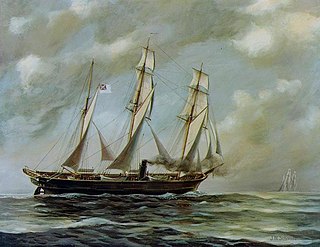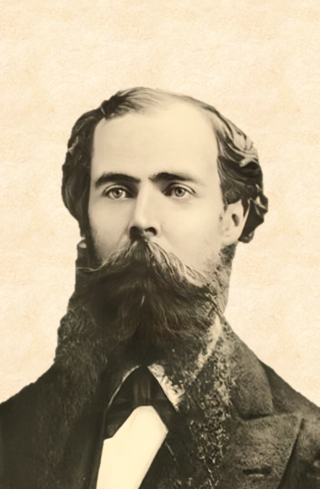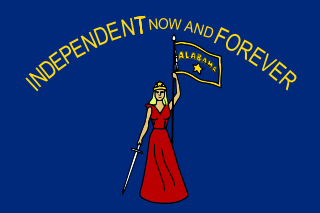
CSS Alabama was a screw sloop-of-war built in 1862 for the Confederate States Navy. The vessel was built in Birkenhead on the River Mersey opposite Liverpool, England, by John Laird Sons and Company. Launched as Enrica, she was fitted out as a cruiser and commissioned as CSS Alabama on August 24, 1862. Under Captain Raphael Semmes, Alabama served as a successful commerce raider, attacking, capturing, and burning Union merchant and naval ships in the North Atlantic, as well as intercepting American grain ships bound for Europe. The Alabama continued through the West Indies and further into the East Indies, destroying over seven ships before returning to Europe. On June 11, 1864, the Alabama arrived at Cherbourg, France, where she was overhauled. Shortly after, a Union sloop-of-war, USS Kearsarge, arrived; and on June 19, the Battle of Cherbourg commenced outside the port of Cherbourg, France, whereby the Kearsarge sank the Alabama in approximately one hour after the Alabama's opening shot.

Henry Clay Work was an American songwriter and composer of the mid-19th century. He is best remembered for his musical contributions to the Union in the Civil War—songs documenting the afflictions of slavery, the hardships of army life and Northern triumphs in the conflict. His sentimental ballads, some of which promoted the growing temperance movement, have also left their mark on American music. Many of Work's compositions were performed at minstrel shows and Civil War veteran reunions. Although largely forgotten nowadays, he was one of the most successful musicians of his time, comparable to Stephen Foster and George F. Root in sales and sheer influence. In songwriting, he is renowned for his dexterity in African-American dialect, seriocomedy and melody.

The "Battle Cry of Freedom", also known as "Rally 'Round the Flag", is a song written in 1862 by American composer George Frederick Root (1820–1895) during the American Civil War. A patriotic song advocating the causes of Unionism and abolitionism, it became so popular that composer H. L. Schreiner and lyricist W. H. Barnes adapted it for the Confederacy.

"Marching Through Georgia" is an American Civil War-era marching song written and composed by Henry Clay Work in 1865. It is sung from the perspective of a Union soldier who had participated in Sherman's March to the Sea; he looks back on the momentous triumph after which Georgia became a "thoroughfare for freedom" and the Confederacy was left on its last legs.
The University of Alabama is a school with many traditions. This article describes several of these traditions.

Irving Gordon was an American songwriter.

"Dixie", also known as "Dixie's Land", "I Wish I Was in Dixie", and other titles, is a song about the Southern United States first made in 1859. It is one of the most distinctively Southern musical products of the 19th century. It was not a folk song at its creation, but it has since entered the American folk vernacular. The song likely rooted the word "Dixie" in the American vocabulary as a nickname for the Southern U.S.

Irwin Silber was an American Communist, editor, publisher, and political activist. He edited the folk music magazine Sing Out! and was active in far-left politics throughout his life.

Roll Tide is the rallying cry for the Alabama Crimson Tide athletic teams. The trademark to the phrase is claimed by the University of Alabama, with licensing and marketing by The Collegiate Licensing Company.

"Kingdom Coming", or "The Year of Jubilo", is an American Civil War-era song written and composed by Henry Clay Work (1832–1884) in 1861. It was published by Root & Cady in 1862 and first advertised in April by the minstrel group Christy's Minstrels. Narrated by Black slaves on a Confederate plantation, "Kingdom Coming" recounts their impending freedom after their master disguises himself as a contraband and flees to avoid being captured by Union troops. It is a minstrel song, written in African American Vernacular English, spoken by slaves, and intended to be performed by blackface troupes.
People's Songs was an organization founded by Pete Seeger, Alan Lomax, Lee Hays, and others on December 31, 1945, in New York City, to "create, promote, and distribute songs of labor and the American people." The organization published a quarterly Bulletin from 1946 through 1950, featuring stories, songs and writings of People's singers members. People's Songs Bulletin served as a template for folk music magazines to come like Sing Out! and Broadside.

"Marching Song of the First Arkansas Colored Regiment" is one of the few Civil War-era songs inspired by the lyrical structure of "The Battle Hymn of the Republic" and the tune of "John Brown's Body" that is still performed and recorded today. The "Marching Song" has been described as "a powerful early statement of black pride, militancy, and desire for full equality, revealing the aspirations of black soldiers for Reconstruction as well as anticipating the spirit of the civil rights movement of the 1960s." The song's lyrics are attributed to the regiment's white officer, Captain Lindley Miller. An almost identical song, "The Valiant Soldiers," is attributed to Sojourner Truth in post-Civil War editions of her Narrative. Recent scholarship supports Miller as the original author, or at least compiler, of the song.

During the American Civil War, music played a prominent role on each side of the conflict, Union and Confederate. On the battlefield, different instruments including bugles, drums, and fifes were played to issue marching orders or sometimes simply to boost the morale of one's fellow soldiers. Singing was also employed not only as a recreational activity but as a release from the inevitable tensions that come with fighting in a war. In camp, music was a diversion away from the bloodshed, helping the soldiers deal with homesickness and boredom. Soldiers of both sides often engaged in recreation with musical instruments, and when the opposing armies were near each other, sometimes the bands from both sides of the conflict played against each other on the night before a battle.
During the American Civil War, sexual behavior, gender roles, and attitudes were affected by the conflict, especially by the absence of menfolk at home and the emergence of new roles for women such as nursing. The advent of photography and easier media distribution, for example, allowed for greater access to sexual material for the common soldier.

Dixie, also known as Dixieland or Dixie's Land, is a nickname for all or part of the Southern United States. While there is no official definition of this region, or the extent of the area it covers, most definitions include the U.S. states below the Mason–Dixon line that seceded and comprised the Confederate States of America, almost always including the Deep South. The term became popularized throughout the United States by songs that nostalgically referred to the American South.

John Paul White is an American musician and former member of the Grammy Award-winning duo the Civil Wars. He restarted his solo career with his 2016 release, Beulah.
"Lincoln and Liberty Too" was a campaign song supporting Republican Abraham Lincoln in the 1860 United States presidential election.

Alabama Shakes are an American rock band formed in Athens, Alabama, in 2009. The band currently consists of lead singer and guitarist Brittany Howard, guitarist Heath Fogg, and bassist Zac Cockrell.

The 3rd Alabama Infantry Regiment was an infantry regiment that served in the Confederate Army during the American Civil War. The 3rd Alabama consisted mainly of men from the Alabama counties of Autauga, Coosa, Lowndes, Macon, Mobile and Montgomery.















